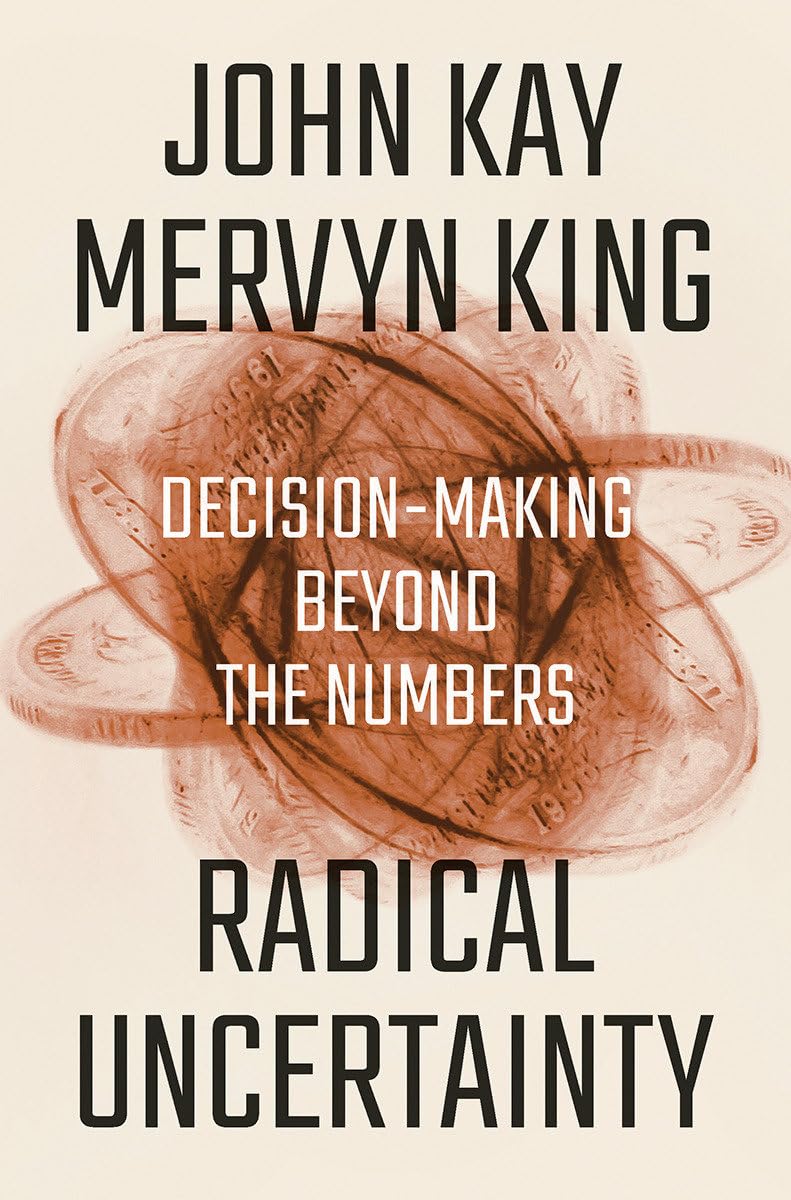

Full description not available
D**I
A little long and a little repetitious but an important methodological critique
The authors, John Kay and Mervyn King, define "radical uncertainty" as the quality pertaining to those questions for which "there is no...means of resolving uncertainty--we simply do not know." While they appear to believe that for at least some of these questions we may have answers sometimes in the future (for example, in forecasting the weather several months in advance of the present), there are others that will be forever out of our ken. However, they do not ever quite address the latter because their focus in this book is on the hubris of their colleagues who create macro-economic models of human behavior. Those models, widely used in the making of economic policy and the normative construction of social theory, implicitly rest on claims to knowledge that, the authors maintain, is clearly unwarranted and professionally irresponsible. In many respects, this book can be paired with Nassim Taleb's "The Black Swan," a highly readable but ultimately inferior analysis of the same problem. That said, "Radical Uncertainty" could have been much shorter and still have made its argument.
C**S
Thinking about making decisions under uncertainly
Certainly, as reviewers have opined, “Radical Uncertainty” could be condensed. If so, “the voice” is lost with personal insights that make it of value. What some reviewers have missed is the stories of Kay and King make their point. To list a few pithy thoughts misses the mark. Admittedly, I learned less because I to learn to think differently over a decade plus of managing risk based projects/prospects. Re macroeconomics Brian Arthur’s complexity economics paper fully illuminated conjectures from real life observations. For me, this book is strong reminder about not accepting inherent assumptions, 'seeing with fresh eyes’, open minded in thinking, It is not a book with a methodology for economic decision making or forecasting ... thinking openly, something many time missing. Decades ago Robert Schlaifer pioneered the quant side ... moving beyond quant, the operable is adaptive thinking.
J**M
Not a book for the casual reader
This book is for academics who are familiar with the sources quoted liberally by authorsThe chapter on narratives was insightful to understand corporate cultures
T**N
Important and practical for improving decision making under risk and uncertainty
I read a lot of books on decision making. It is awesome to have a book by established economists that help us sort out the dangers of making high-stake decisions using models that cannot predict the future with any level of reliability. This leads us to be unprepared until it's too late. They make the important distinction between RESOLVABLE vs RADICAL uncertainty. With resolvable uncertainty we can eliminate uncertainty; with radical uncertainty we cannot---we just cannot know. The most important decisions we make are under radical uncertainty, so it is worth our time and effort to learn how to tackle these scenarios.
G**N
Well worth reading
I liked this book’s approach to uncertainty and think its advice is well worth considering where economic and financial matters are concerned. I tend to think it is dead on in the insight that there is a tendency to “mistake the model for the territory.” It is strongest on these kinds of points. But the book is less deft in its references to cultural and historical events. For example, in comparing the initial reaction to the west from China and from Japan, the book gives the impression that the Japanese were closed to western culture until after 1945. This is simply not correct: the story of Japan moving from a feudal, nearly medieval society to a industrialized one in a single generation, and then making use of ideas and technology from the west to defeat a major European power (Russia) at sea and on land is well known. There are other generalizations of this kind which make me sometimes wonder about the book’s analysis.
M**O
Moved my thinking forward
I, too, believed that probabilistic reasoning was the forefront of decision making. This book is pioneering a greater faith in the evolved capacity of "eye-balling" a complex problem -- a mystery as it were -- to reach good enough decisions. It's a rare flattering comment on human selves as an evolved species. An outstanding read with deep insights presented clearly and entertainingly.
C**Y
Chaos at its best
Wonderful and detailed book that I feel picks up where The Black Swan left off. If you’re fascinated with uncertainty in your life you’ll love this book.
Trustpilot
2 days ago
1 week ago